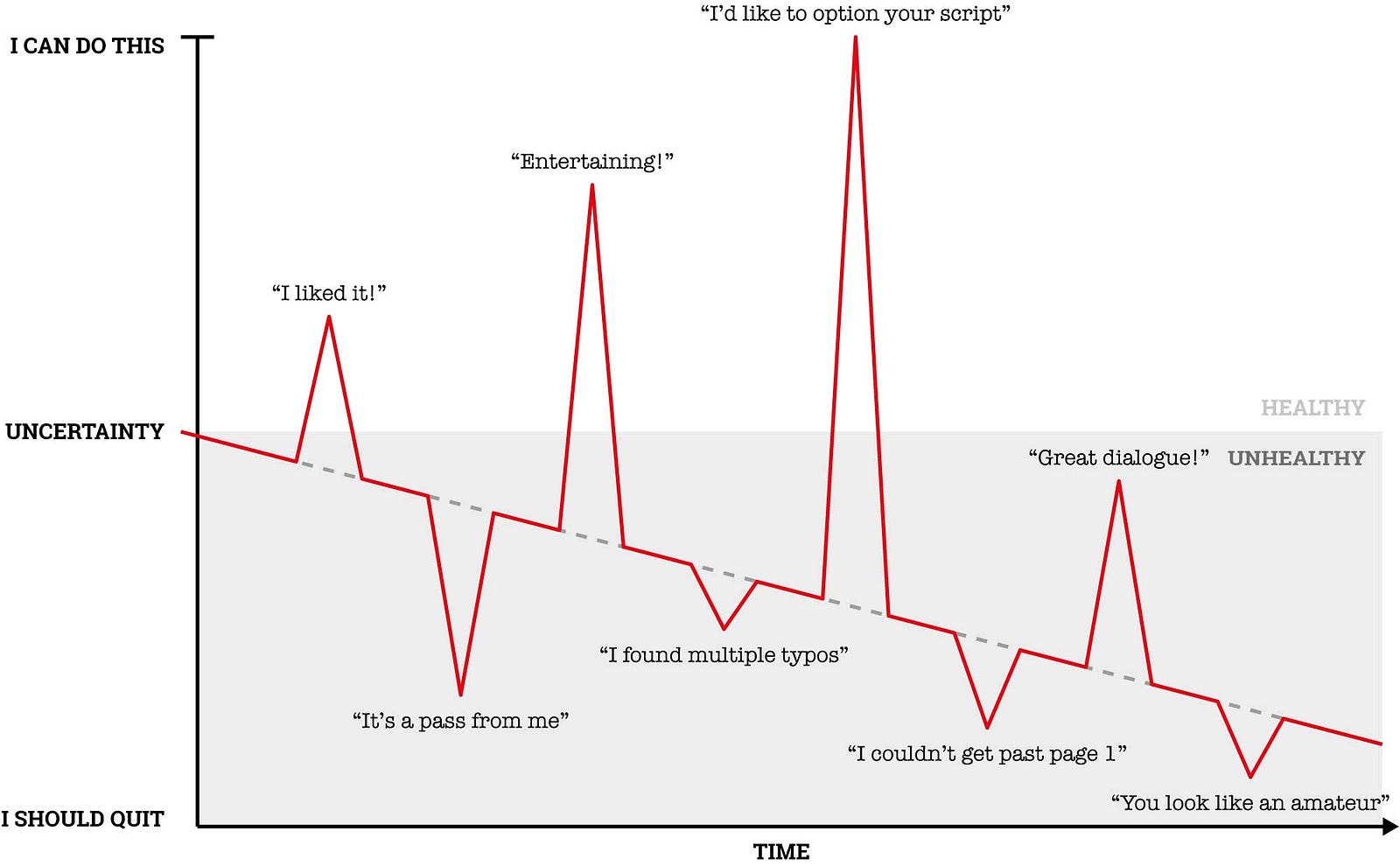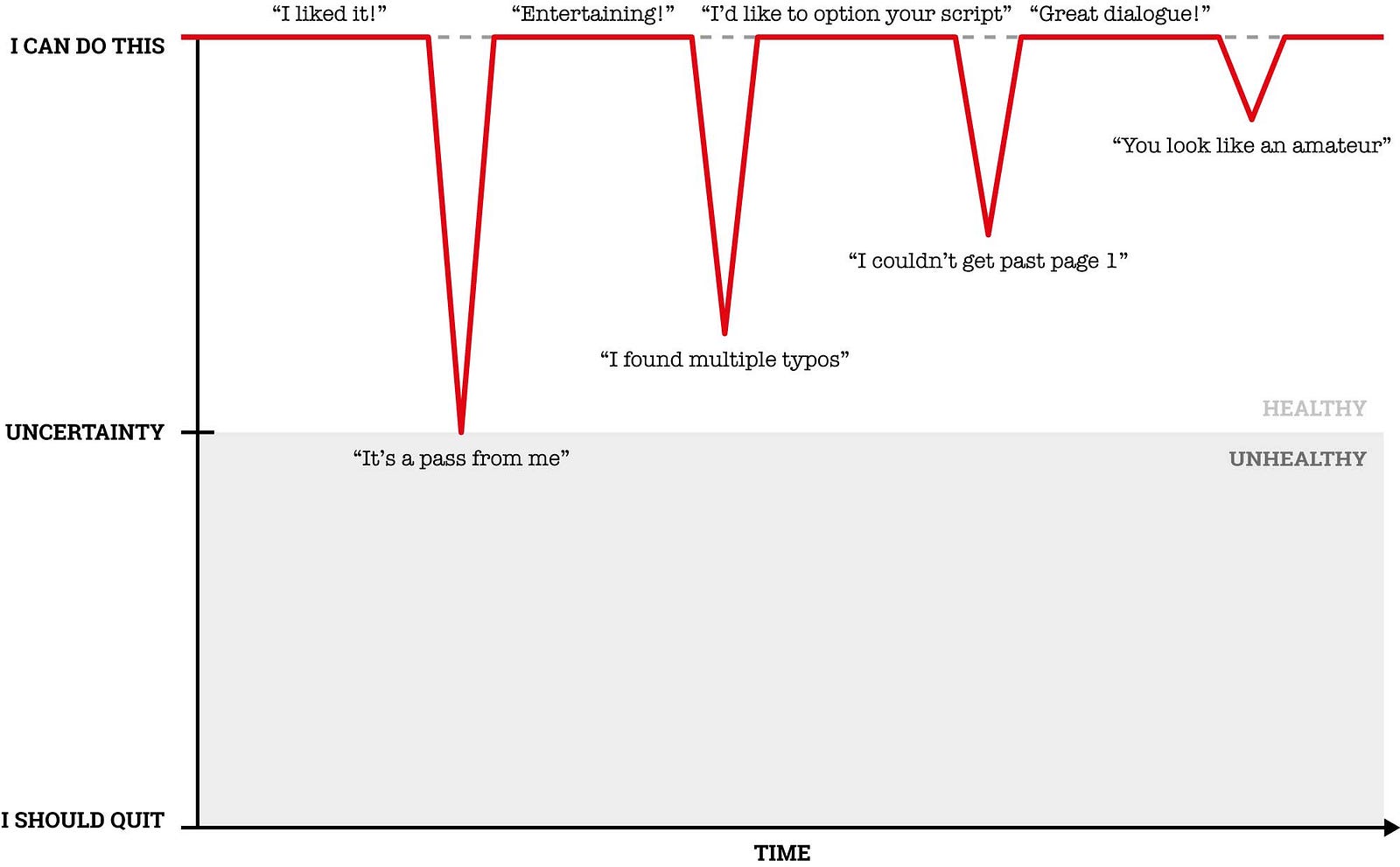Which script should you write next? Would people want to read it? Is the idea bad? Do you have the skills needed? Are you really just wasting your time… and life?
Look, I don’t know a single aspiring screenwriter who doesn’t have those questions running through their mind all the time. Creative pursuits are, by their nature, a massive mind-fuck. It gets even tougher when you tie success with money, fame, and respect. You worry. You fret. You judge yourself. You let other people judge you. It’s hard not to default to one of three chains of thought; “I can do this.”, “don’t know if I’m any good”, or “I should quit”
I want to help reframe our thinking. As some of you know, I think personal well-being is critical to creatives. A toxic mind can result in toxic actions and ultimate toxic material. We have to be our own best friends and champions and not fall into the trap of believing applause is our only key to survival.
I want to talk about words. Anybody who’s been through counselling or therapy will know that words are incredibly powerful things. You’d think, as writers, we’d know that by default, but it’s all too easy to have a voice inside your head that speaks with a destructive vocabulary. It may be disarming to others to speak of yourself as “a struggling writer” but letting a summary like that infect your mindset is incredibly dangerous to your psyche — and no, tough love isn’t what you need, it’s the last thing you need.
Two words; Permission & Validation. Their meaning may have significance to you right off the bat. Their differences may be apparent to you right away. The fact is, they are two incredibly different terms that, if we’re not careful, can dominate our view of ourselves and the point of what we’re doing.
When I see writers asking for feedback, I know they’re really asking for validation. I think validation is possibly the biggest concern we tend to have, especially early on, and it’s something that doesn’t seem to leave us. I guess it’s a lot like respect, the more of it we accrue, the more we expect, and if it isn’t from the right people in relation to the right things, we are never satisfied.
I see writers asking for permission a lot too. They rarely do it directly, but it’s there within the context of their question. “Is this a good idea?”, “Do my slug-lines look okay?”, “Should I change my tragic ending?”. A lot of the time, the question is bordering on rhetorical. You just know that the writer wants to go down a road but has fears about doing so. What’s frustrating to watch is when those fears are built upon by other timid writers or new fears are created by those who can’t see their own subjectivity.
Permission is a dangerous thing to seek out in a world of artistry where rebellion is often required. Yet, like the Mary Sue in a bad high school movie, we deny ourselves the actualisation we deserve on the basis we’re not worthy. This is insanity, but none the less the kind of insanity we’re all too familiar with. It feels healthy to have some humility and unhealthy to fuel our egos.
We can have egos and still preserve our humility. The answer is to pursue self-actualisation and that’s just as daunting as it sounds. It’s also however incredibly fulfilling and empowering.
We have to stop looking for permission from others and start appreciating validation when we get it. We need to become writers who can say to ourselves, “I’m going to do this because I alone want to do it, and because I know I’m fully capable of it.” That’s a lot different to our all too common “I’m unsure I should do what I want to do, because I fear others won’t like it, or I lack the ability to make it happen.”
Part of the issue is we easily dismiss validation while obsessing over fear. We tend to adopt this mindset of neutrality while seeing minor criticisms as proof we should quit and compliments as proof others are deluded. Now look, there’s nothing wrong with a bit of modesty. I’m British, boasting over here is punishable by the Queen herself. However, what did I say about being our own champions? We have to credit ourselves where it’s due, and those credits are easy to miss.
The diagram below shows how I see our mood often is. We default to uncertainty at first. We see ourselves as in this halfway point between knowing we can do this and feeling we should quit. When we get negative feedback, it sends us plummeting down into despair and builds the case against continuing. It sets a new normal, falling a little short of where it was previously. Most positive feedback we get creates a fleeting moment of positivity before we get back on the downward trend and settle back into self condemned purgatory. This can eventually become an healthy place for a creative regardless of positive feedback, resulting in low motivation, poorer work, a fearful approach, or even quitting. If this looks like your mood and motivation over your writing experience, it’s time to take action and think differently.

This diagram below shows how I think our mood should be. I feel we should default to believing we can do this. Why not? We stand to lose nothing from self-belief. No, it doesn’t mean we’ll rest on our laurels. We can believe in ourselves while still honing our craft. The negative feedback should not drag us down below uncertainty. People often don’t align on taste and we should know two people can have totally opposed views on a script. History is full of countless stories were an artist didn’t find a single fan until later in their career, where they suddenly became admired by nearly everyone. Group dynamics are a bitch. Yes, those criticisms will hurt at first but they’ll have less of a negative effect over time. The positives however, pleasing the odd person, getting a compliment, those are all 100% certifiable proof that we do it. It should not be written off. Sure, we should never get cocky, but we absolutely must take a win and enjoy it from time to time otherwise when are we going to ever feel like we’ve succeeded?

Look, I know it’s a tough world out there. I know there are writers, some of whom are seemingly successful, who really want to tell you to beat yourself up. A lot of us also like to push ourselves hard and often make the mistake that flogging ourselves is a hardship that demands reward. SPOILER ALERT: it isn’t.
There’s a fear pushed out there that many screenwriters trying to break in are wasting their lives and will live to regret it. I disagree. I believe there’s many screenwriters who’ve broken in who are wasting their lives caring far too much about the wrong things. All that really matters is who’s happy and who isn’t. I’d rather be a fulfilled writer with no accolades than a successful one slowly descending into a personal hell.
Can you even quit though? I don’t think we can. I think that’s an absurd suggestion. We can however quit fuelling a toxic mindset by reframing how we see ourselves. We can quit letting negative feedback taking a little bit of our soul each time.
If you’re stuck in a rut right now then go through your feedback and start putting together a scrapbook of positive comments. You’ll probably be surprised how many you’ve forgotten. And, next time you get a win, no matter how small, reward yourself with something nice.
Be your own champion, cheer yourself on, pick yourself up, and give yourself a pat on the back — you deserve it
